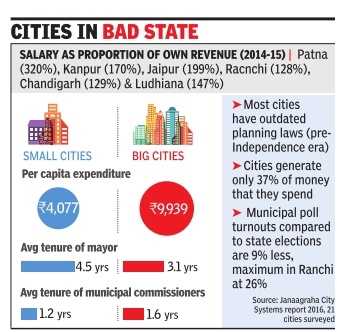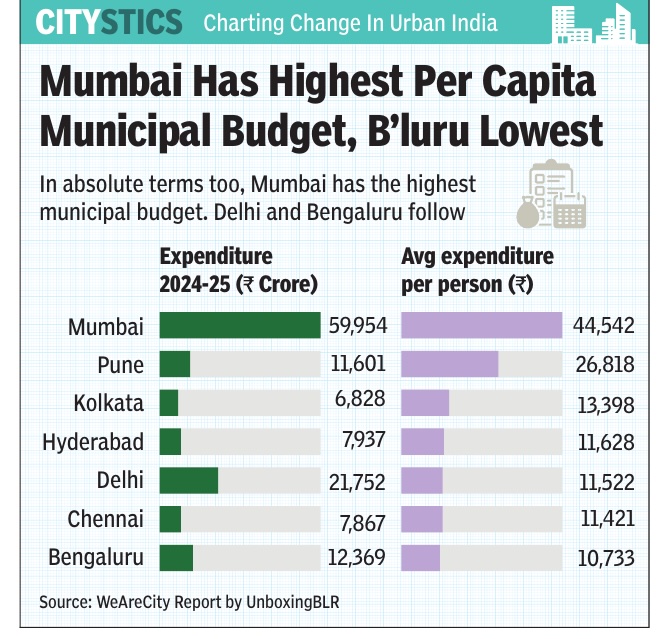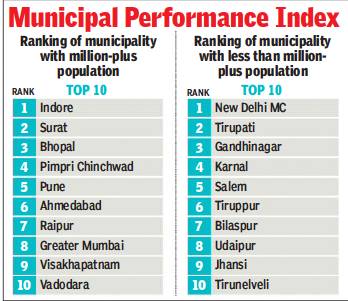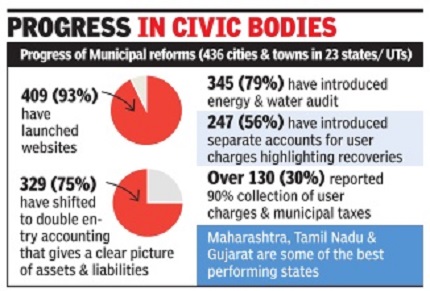Local bodies, urban (Municipalities, corporations): India
This is a collection of articles archived for the excellence of their content. |
Contents |
Finances, revenues of urban local bodies
2011- 18
Dipak K Dash, Nov 15, 2022: The Times of India

From: Dipak K Dash, Nov 15, 2022: The Times of India
NEW DELHI: Several large and medium civic bodies can't even earn enough from the tariff and charges for municipal services such as water supply and sewage management to meet operations and maintenance (O&M) costs incurred due to policy decisions to keep charges for such services below the economic cost, the World Bank has said in its latest report.
While highlighting that the current trend of low revenue of urban local bodies (ULBs) and less than required spending on urban infrastructure will hurt India's growth story, it said the country needs to increase investments by more than 300% for the next 15 years to meet future needs. The report released on Monday has estimated the need for annual investment of $55 billion (Rs 4.46 lakh crore) in urban infrastructure compared to the current rate of $16 billion (Rs 1.3 lakh crore) while underlining the urgent need to leverage more private and commercial investments to meet the emerging financial gaps.
"Policy decisions to keep tariffs and service charges below levels required for cost recovery and financial sustainability are contributing to low revenue. ULBs and utilities are generally unable to recover O&M costs, let alone capital costs, of providing services such as water supply and sewerage," the report said. Service charges and property tax are the two major sources of own revenue of municipal bodies. The ULBs across the country either avoid revising service charges or declare waiving off outstanding fees before elections.
Srikanth Viswanathan, CEO of Janaagraha said people are willing to pay provided services are predictable and meet certain standards. "The three reasons why service charges are not being raised are - civic agencies are not guaranteeing predictable services, councillors aren't realising that citizens are willing to pay, if services are good, and civic agencies aren't measuring cost of service delivery.”
2017: Many civic bodies don't earn enough to pay staff
Dipak Dash, Many civic bodies don't earn enough to pay staff, March 4, 2017: The Times of India

Salaries Go From State Govt Aid
The Patna municipal corporation's annual revenue collection is just enough to pay one-third of its salary bill. Municipal bodies of Kanpur, Ranchi, Jaipur, Chandigarh and Ludhiana also do not earn enough to pay salaries to their staff.
These are some of the findings of a survey of 21 big municipal corporations by advocacy group Janaagraha Centre for Citizenship and Democracy . These civic bodies not only depend on financial support from states for developmental work but also use the earmarked funds for salaries. According to JCCD's fourth survey on “India's City Systems“, the salary of Patna municipal corporation's employees is 320% more than its earnings. In the other five cities, mentioned in this report, the salary expense is in the range of 128199% of the total income of the municipalities.
The number of such municipalities is much more considering the fact there are several reports of how salary disbursement to employees in different cities usually get delayed. The findings come at atime when the Centre is pushing for building smart cities involving municipal bodies.On governance parameters, Thiruvananthapuram has scored the maximum.
The survey shows how smaller cities have weak finances and can't make future investments for infrastructure and services. For example, the annual expenditure of Greater Mumbai municipal body is about Rs 33,000 crore for 12.4 million people. Almost similar amount is together spent annually by the next 10 populous cities, including Delhi, Ahmedabad, Pune, Lucknow, Bangalore and Chennai, which have a total population of 54.4 million.
The report also exposes how none of the 21 cities it surveyed have effective policies to stop violations of planning norms, which is evident from the mushrooming of slums, unauthorised colonies and illegal constructions.All cities scored “zero“ on this parameter as compared to 9.1 to 10 for London and New York. A survey conducted by Bangalore municipal corporation in 2014 found only three out of 400 buildings conforming to rules.
The average tenure of municipal commissioners in the past five years across these cities was 1.2 to 1.6 years. The tenure of mayors was 3.1 to 4.5 years. The urban ministry has asked states to have municipal cadre and recruit people who are professionally qualified. It also asked for allowing lateral entry of experts for specific posts and for a specified contract period.
2024-25: The Metropolitan Cities

From: June 19, 2025: The Times of India
See graphic:
2024-25: The budgets of municipal corporations in India’s Metropolitan Cities
Mayoral elections
Nominated members cannot vote: SC, 2023
Dhananjay Mahapatra, February 14, 2023: The Times of India
New Delhi : The Supreme Court indefinitely postponed the February 16 MCD mayoral elections and said ‘prime facie’ the LG-nominated members (aldermen) cannot vote in the election to the post of mayor, which is in sync with AAP’s stand in its petition seeking early election of the mayor.
Appearing for AAP, advocate AM Singhvi told a bench of CJI D Y Chandrachud and Justices P S Narasimha and J BPardiwala that Article 243R of the Constitution specifically barred nominated members from voting “in the meetings of the municipality”. The bench said, “One thing is clear. Prima facie Article 243R mandates nominated members can’t vote in a municipality. ” The SC will hear AAP’s plea on Feb 17.
‘Presiding officer in breach of statutory framework’
For the protem presiding officer Satya Sharma, whose appointment has also been questioned by AAP on the ground that she is not the senior-most corporator, senior advocate Maninder Singh said the issue relating to voting by nominated members in mayoral elections is open to debate.
Nominated members vote in the elections of members of standing committees, which together form a vital component of MCD, Singh said. Appearing for BJP mayoral candidate Rekha Gupta, senior advocate Ranjit Kumar said he too has points to make and sought to be made a party in the proceedings as AAP had not listed her as a respondent in its petition.
The bench agreed to hear Kumar on February 17. AAP has 151 votes in MCD – 134 elected councillors along with 13 ELECTED AND 3 MPMLAs, 3 MPs and one independent councillor supporting AAP mayoral candidate. BJP has a total of 112 votes in MCD – 104 elected councillors, seven MPs and one MLA, they said.
"Clearly, BJP does not command majority support in the Corporation tobe able to elect its candidate as mayor. For this reason, BJP councillors of the Corporation are deliberately creating ruckus and delaying the elections to the office of the mayor," said the petitioners – AAP and its mayoral candidate Shelly Oberoi.
Criticising the pro tem presiding officer, the petitioners said she has in breach of the statutory framework, directed holding of simultaneous elections for the posts of mayor, elections for the posts of mayor, deputy mayor and standing presiding authority. AAP said the pro tem presiding officer’s role should come to an end after election of the mayor.
Municipal Performance Index
2020
Dipak Dash, March 5, 2021: The Times of India

From: Dipak Dash, March 5, 2021: The Times of India
India’s ‘cleanest city’ Indore has the best-performing civic body among all municipal areas with a population of over one million, in the firstever such ranking by the Centre. New Delhi Municipal Council (NDMC), which covers the entire power centre of Lutyens Bungalow Zone, has been ranked the best among the smaller municipalities, reports Dipak Dash.
The Municipal Performance Index 2020 ranks 114 civic bodies on parameters of service delivery, planning, financial systems and governance practices. Besides Indore, the other best-performing bigger municipalities are Surat, Bhopal, Pimpri Chinchwad, Pune and Ahmedabad. The South Delhi, East Delhi and North Delhi Municipal Corporations are ranked 28th, 42nd and 48th respectively.
Majority of municipalities fared poorly in plan implementation
Ghaziabad, Meerut and Faridabad municipal corporations are ranked 20th, 29th and 40th rank respectively. The worst are Guwahati, Kota, Srinagar and North Delhi Municipal Corporation.
Among the small municipal bodies, besides NDMC the other top performers are Tirupati, Gandhinagar, Karnal and Salem. The worst performers are Shillong, Imphal, Kohima and Pasighat.
“Whereas, the Ease of Living Index measures an outcome of the indicator, MPI focuses on the factors that produce those outcomes,” the ministry said.
According to the report, municipal corporations surveyed achieved an average score of 43.1 on the Municipal Performance Index, showing that Indian municipalities still have a long way to go and have immense potential for achieving their urban development goals.
The report has also flagged that the majority of the municipalities have scored below the national average and median in terms of plan implementation. “While nine municipalities have emerged as perfect positive outliers in this sectors, the overall performance of municipalities have significantly fallen short of, especially in terms of land titling, and land pooling,” it said. It has also flagged how with northern and north-eastern states lagging behind, municipalities such as Shillong, Guwahati and Imphal have attained the bottom ranks across all verticals.
Municipal reforms
2003-14: Bimaru states do well
Dipak Dash, `Bimaru' shines in urban reforms, Sep 29 2016 : The Times of India
Municipalities In Bihar, MP, Raj, UP Fare Better
Bihar, Madhya Pradesh, Rajasthan and Uttar Pradesh traditionally tagged as `Bimaru' states have made major progress in urban municipal reforms in recent years, while Delhi has not submitted any claim of reforms.States such as Tamil Nadu, Maharashtra, Andhra Pradesh and Gujarat, which have always performed better in such reforms, lead from the front again in the assessment by the urban development ministry .
The assessment is based on documentary evidence after 23 states and Union territories submitted their claims for 436 of the 500 cities covered under urban renewal mission, AMRUT. The mandatory reforms under this scheme include e-governance, double entry accounting, water and energy audit and 90% collection of municipal taxes and user charges.
“The states that have made good progress in the past one year will be rewarded with financial incentives during the India Sanitation event,“ an urban development ministry official said. Good per formers will be rewarded a total of Rs 400 crore at the event, sources said.
Officials said the 436 cities and towns, including those with over one lakh population, have taken significant initiatives to enable e-governance, credit rating necessary for issue of municipal bonds, professionalisation of municipal cadre, augmenting revenue collection and efficient use of water and electricity .
On the whole, 329 of the 436 cities have shifted to double entry accounting which give a clearer picture of assets and liabilities and 345 have introduced energy and water audit. An official said 131 of the cities have achieved over 90% collection of user charge and 141 cities have recorded similar collection of municipal taxes. Increasing revenue base remains a tough task for municipal bodies.
Cities that collect 90% of municipal taxes and user charges include Lucknow, Allahabad, Mathura, Chandigarh, Raipur, Dewas, Kolhapur, Surat, Vadodara, Thiruvananthapuram, Mysuru, Tirupati, Vijayawada, Cuttack and Aizawl.
According to the assessment, 381 cities and towns have taken steps to bring young professionals in municipal bodies and 78% have initiated measures towards single window clearances.
Under JNNURM implemented during the UPA (2004-14), urban reforms were promoted in 65 cities.
